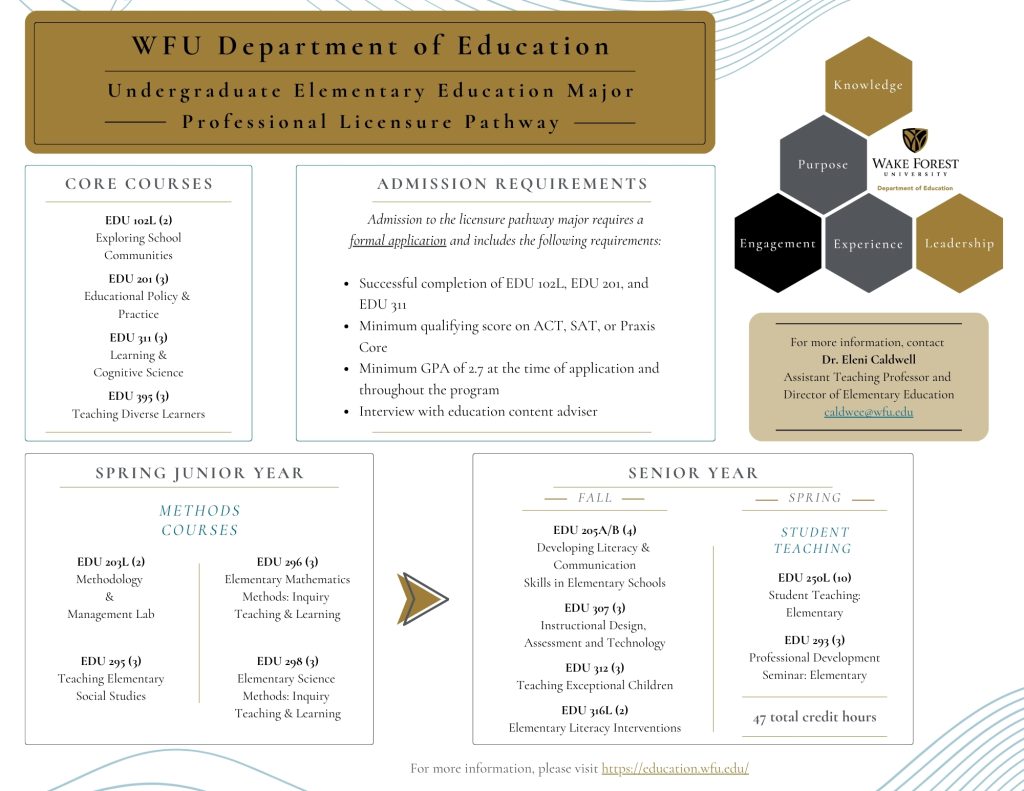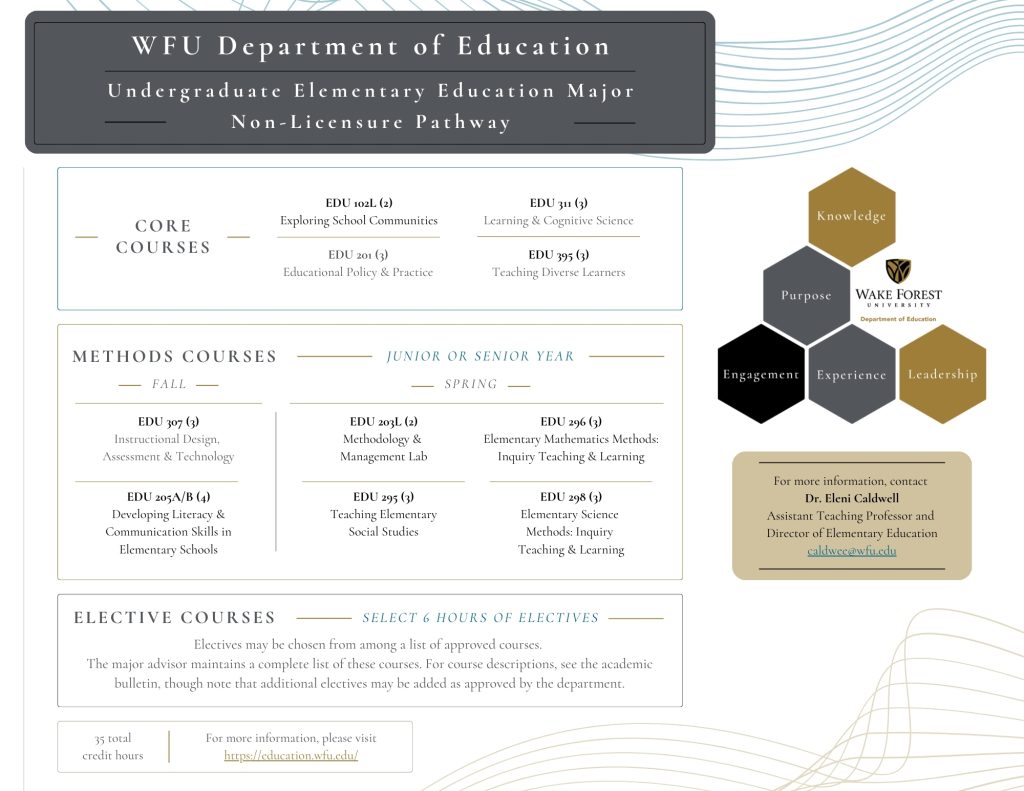Elementary Education Major
Program Overview
The elementary education major offers two unique pathways: (1) a 47-credit hour professional licensure pathway that includes a full-semester student teaching internship and (2) a 35-credit hour non-licensure pathway where students substitute fewer elective courses in lieu of the student teaching internship.
All undergraduate students majoring in elementary education will take 29 hours of core education courses as described in the Academic Bulletin. Required courses (EDU 102L, EDU 201, EDU 311, EDU 395) should be taken before the spring of junior year.
Elementary Education Major
(Licensure Pathway)
The Elementary Education Licensure Pathway is perfect for undergraduate students who are planning to pursue a career in teaching and hope to obtain a North Carolina teaching license (K-6). This pathway includes a full-semester student teaching internship in a local elementary school.

Along with 29 hours of core education courses, students will take an additional 18 hours of methods and internship courses to fulfill the 47-credit hour Elementary Education Licensure Pathway Major.
Required Courses (Before Spring Junior Year)
- EDU 102L: Exploring School Communities (2)
- EDU 201: Educational Policy and Practice (3)
- EDU 311: Learning and Cognitive Science (3)
- EDU 395: Teaching Diverse Learners (3)
Methods Courses (Spring Junior Year)
- EDU 203L: Methodology and Management Lab (2)
- EDU 295: Teaching Elementary Social Studies (3)
- EDU 296: Elementary Mathematics Methods: Inquiry Teaching and Learning (3)
- EDU 298: Elementary Science Methods: Inquiry Teaching and Learning (3)
Methods Courses (Fall Senior Year)
- EDU 205a/b: Developing Literacy and Communication Skills in Elementary Schools (4)
- EDU 307: Instructional Design, Assessment, and Technology (3)
- EDU 312: Teaching Exceptional Children (3)
- EDU 316L: Elementary Literacy Interventions (2)
Student Teaching (Spring Senior Year)
- EDU 250L: Student Teaching: Elementary (10)
- EDU 293: Professional Development Seminar: Elementary (3)
Admission to the licensure pathway major includes the following requirements:
- Major declaration through the University Registrar’s Office
- Teacher education application
- Successful completion of EDU 102L, EDU 201, and EDU 311 with a minimum grade of C in each course
- Minimum qualifying score on ACT, SAT, or Praxis Core
- Minimum GPA of 2.7 at the time of application and throughout the program
- Recommendation from Education Faculty Member (EDU 102L, EDU 201, or EDU 311 Professor, or Content Area Coordinator)
The formal application, submission of supporting documentation, and completion of these requirements must be completed by September 30th of the junior year. Late applications may be reviewed on a case-by-case basis.
There are minimum requirements for undergraduate licensure programs. On rare occasions, when applicants do not initially meet all requirements and are advised to delay the application or seek irregular admissions, they must write a request and receive written permission for formal acceptance by a faculty committee consisting of the department chair, graduate program director (if applicable), and elementary education faculty. All licensure program requirements must be met prior to graduation.
After the application materials are received by the Department of Education, candidates will receive a letter stating the decision on their application. There are three responses: formal acceptance, rejection, or acceptance deferred. The deferred decision includes the conditions for formal acceptance. Once admitted to the program, students become teacher candidates, form a cohort, and are immersed in education coursework during the spring semester of their junior year and both semesters of their senior year.
Prerequisites for registering for student teaching include (1) senior, graduate, or special student classification; (2) completion of all preliminary education courses; and (3) formal admission to the teacher education program.
Students are assigned to a student teaching placement by their program coordinator with approval from public school officials based on the professional needs of the student and the public school system. The student’s second semester of senior year at the university is generally reserved for the student teaching internship and related courses. Students may not take courses outside of the Department of Education during this semester without prior approval from the department chair.
Graduation requirements for professional licensure candidates include:
- A minimum grade of C in each course attempted in education
- At least a 2.7 GPA while enrolled in the Teacher Education Program
- Submission of qualifying scores on the appropriate edTPA performance-based, subject-specific assessment
- Additional requirements for candidates to be recommended for professional licensure include passing all appropriate state-required standardized tests.
The North Carolina Department of Public Instruction issues the Professional Class A Teaching License to graduates who have completed an approved program, including the specified courses in their teaching field(s) and the prescribed courses in education. These graduates must also demonstrate mastery of specific competencies and receive recommendations from the designated official(s) in their teaching area(s) and from the Licensure Officer. Additional information about teacher licensure can be located through the Teacher Licensure Office.
The Elementary Education Program has multiple internal and external measures for student learning outcomes. Eight total measures make up the student’s professional teaching portfolio throughout their coursework. Assignments are submitted in specific courses, and the portfolio is organized and evaluated as part of three Student Learning Outcomes: (1) Planning, (2) Instruction, and (3) Assessment.
Student Learning Outcome 1: Planning
- Measure 1: edTPA. Planning for Instruction and Assessment (EDU 250, licensure pathway only)
- Measure 2: Key Assessment 1. Content-Focused Lesson Plan (EDU 296)
- Measure 3: Key Assessment 2. Culturally Responsive Lesson Plan (EDU 395)
- Measure 4: Key Assessment 3. Literacy Mini-Lesson (EDU 205)
Student Learning Outcome 2: Instruction
- Measure 5: edTPA. Instructing and Engaging Students in Learning (EDU 250, licensure pathway only)
- Measure 6: Key Assessment 4. Classroom Management Project (EDU 203)
Student Learning Outcome 3: Assessment
- Measure 7: edTPA: Assessing Student Learning (EDU 250, licensure pathway only)
- Measure 8: Key Assessment 5. Data Literacy Project (EDU 307)
For more information about the Elementary Education Program at Wake Forest University, please see the Elementary Education Handbook.
The Elementary Education Licensure Pathway Major is proud to meet rigorous state and national standards for educator preparation. We are fully accredited by the North Carolina Department of Public Instruction (NCDPI) and the Association for Advancing Quality in Educator Preparation (AAQEP).
Elementary Education Major
(Non-licensure Pathway)
The Elementary Education Non-licensure Pathway is perfect for undergraduate students with an interest in teaching and/or grades K-6 education but who do not plan to student teach or pursue a teaching license as an undergraduate. This 35-credit hour pathway is different from the licensure pathway in that it does not require a full-semester of student teaching and related coursework and therefore does not lead to a North Carolina teaching license.
The Non-licensure Pathway is optimal for students whose schedules are limited due to studying abroad, double-majoring, participating in collegiate athletics, and/or will be seeking a teaching license as part of an initial licensure Master’s program after graduation. There is no formal application to the Elementary Education Non-licensure Pathway. For more information about major/minor declaration, see the University Registrar’s Office.

Along with the 29 hours of core education courses, students will also take 6 hours of education electives to fulfill the 35-credit hour major. Elective courses may be chosen from among the list of approved courses. Additional elective courses may have been approved since publication of the academic bulletin. The major advisor maintains a complete list of all approved elective courses. For course descriptions, see the course listings in the academic bulletin.
The Elementary Education Program has multiple internal and external measures for student learning outcomes. Eight total measures make up the student’s professional teaching portfolio throughout their coursework. Assignments are submitted in specific courses, and the portfolio is organized and evaluated as part of three Student Learning Outcomes: (1) Planning, (2) Instruction, and (3) Assessment.
Student Learning Outcome 1: Planning
- Measure 1: edTPA. Planning for Instruction and Assessment (EDU 250, licensure pathway only)
- Measure 2: Key Assessment 1. Content-Focused Lesson Plan (EDU 296)
- Measure 3: Key Assessment 2. Culturally Responsive Lesson Plan (EDU 395)
- Measure 4: Key Assessment 3. Literacy Mini-Lesson (EDU 205)
Student Learning Outcome 2: Instruction
- Measure 5: edTPA. Instructing and Engaging Students in Learning (EDU 250, licensure pathway only)
- Measure 6: Key Assessment 4. Classroom Management Project (EDU 203)
Student Learning Outcome 3: Assessment
- Measure 7: edTPA: Assessing Student Learning (EDU 250, licensure pathway only)
- Measure 8: Key Assessment 5. Data Literacy Project (EDU 307)
Wake Forest University believes that the teaching profession is important to society and that society’s welfare is significantly affected by the quality of educational leadership. One of the important objectives of the university has been and continues to be the preparation of teachers and other professional school personnel. The university’s commitment to quality in teacher education is demonstrated by selective admission to the program, a wide range of academic courses, and closely supervised field experiences appropriate for the professional needs of all students.
For general inquiries regarding the elementary education program,
please contact Dr. Leni Caldwell, Director of Elementary Education.
